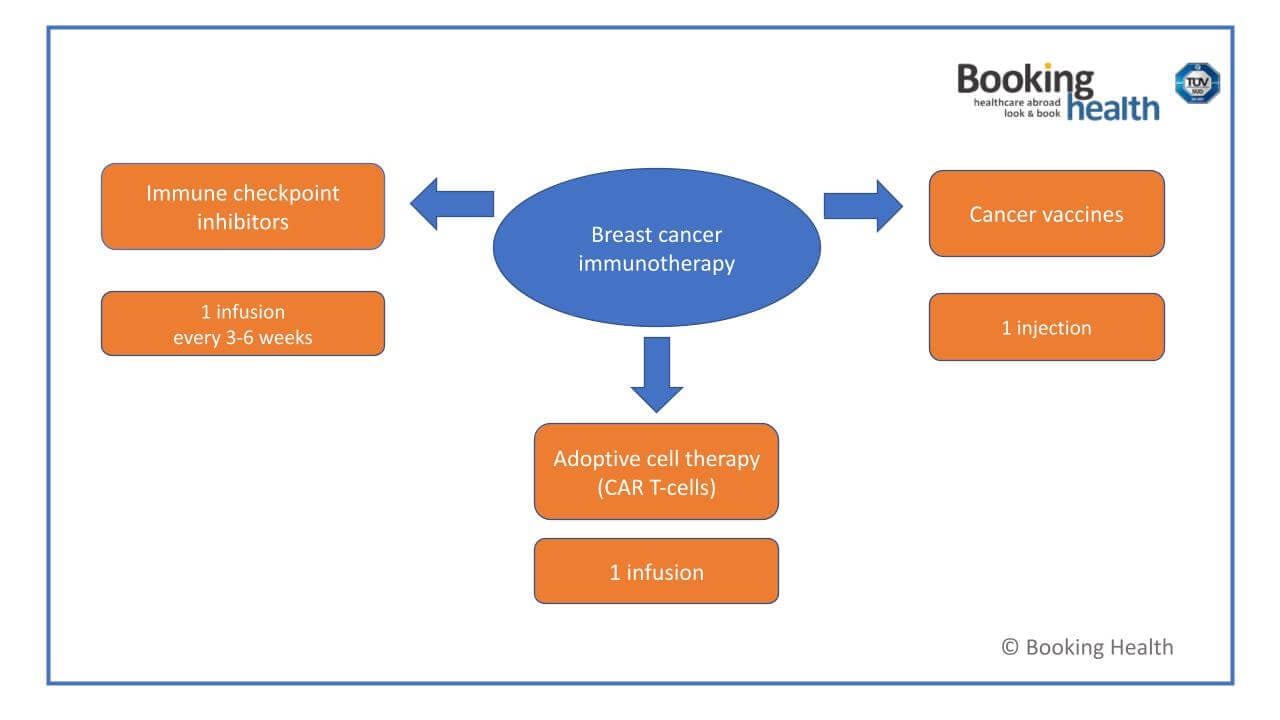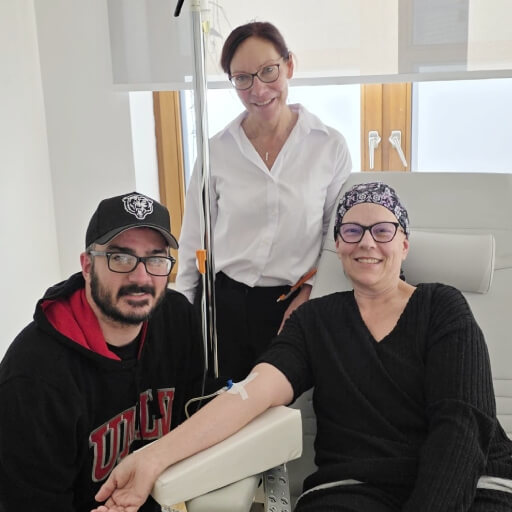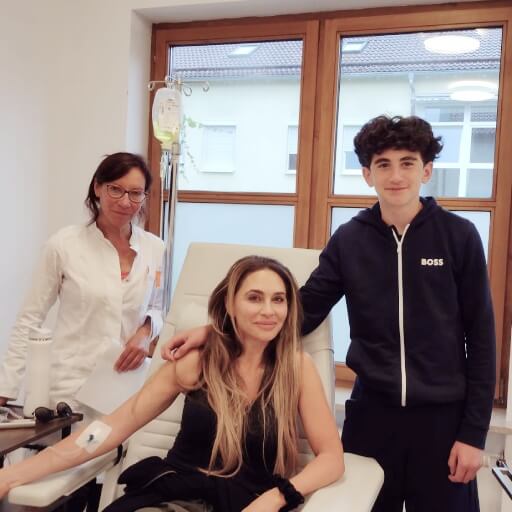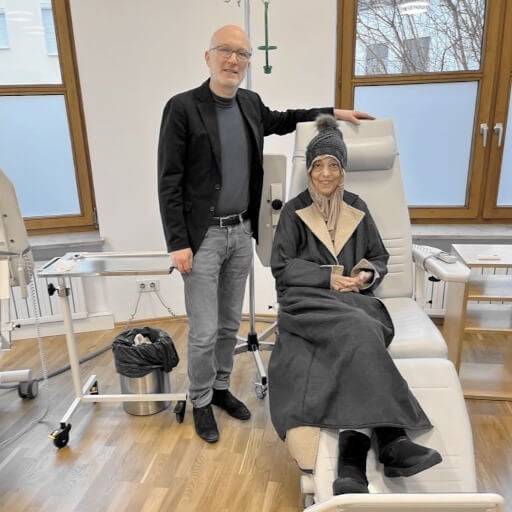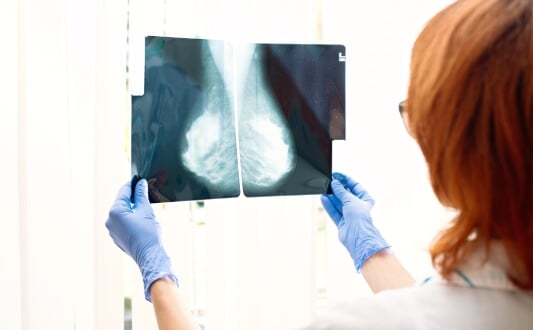Breast cancer immunotherapy represents a groundbreaking advancement in oncology, encompassing various innovative approaches to cancer treatment. German clinics are at the forefront of implementing these advanced therapies, from immune checkpoint inhibitors to dendritic cell vaccines – the latter made possible by Ralph Steinman, who was awarded the 2011 Nobel Prize in Medicine for his discovery of dendritic cells. Their expertise has proven particularly effective in treating challenging cases – metastatic, triple-negative, and recurring breast cancers. Through personalized treatment protocols and custom-manufactured therapeutic agents, German specialists harness the body's natural defenses against cancer cells, significantly improving both survival rates and quality of life for breast cancer patients.
When is immunotherapy administered for breast cancer?
The main tasks of immunotherapy treatment for breast cancer are as follows:
- Stop or slow down the growth of the primary tumor and its metastases
- For unresectable cancer – prevent metastasizing
- For resectable cancer – prevent recurrence after surgery
- Increase the effectiveness of other cancer treatments (e.g., chemotherapy, radiation therapy)
In the early cancer stages, with large resectable tumors, the doctor may prescribe immunotherapy before surgery, in combination with chemotherapy. This helps to reduce the size of the tumor and make the operation easier: for example, to resect the breast instead of removing it completely. After the operation, immunotherapy is continued without chemotherapy; now, it is aimed at relapse prevention.
If doctors do not perform surgery to remove a breast tumor, then immunotherapy is used to control the disease. It inhibits the further tumor growth and spread of metastases throughout the body. This option is used in the advanced cancer stages, with active metastasizing, or if the woman refuses surgical treatment for any reason. In the advanced stages of cancer, immunotherapy is combined with chemotherapy, hormone therapy, and radiation therapy. This is possible due to its excellent tolerability and the absence of severe side effects.
What are the types of immunotherapy for breast cancer?
Immunotherapy combines drugs that destroy cancer cells by acting on different parts of the immune system. Sometimes these are factory-made drugs; sometimes, these are drugs that are manufactured individually, using the patient's immune cells. In German hospitals, doctors use three main groups of immunotherapeutic drugs, these are:
- Immune checkpoint inhibitors (PD-1/PD-L1 inhibitors, CTLA-4 inhibitors)
- Cancer vaccines, e.g. dendritic cell vaccines
- Adoptive cell therapy, i.e. CAR T-cell therapy
Immune checkpoint inhibitors are drugs that disrupt a tumor’s ability to hide from the attacks of the immune system. Normally, a woman's immunity recognizes and destroys the very first malignant cells in the mammary gland, preventing tumor development. Unfortunately, a tumor can hide signs of malignancy and resemble healthy tissue. This is recognized and removed by immune checkpoint inhibitors. The pharmacological group includes drugs against various tumor molecules: PD-1 or PD-L1 inhibitors and CTLA-4 inhibitors. Before the treatment starts, doctors determine the initial level of PD-1 in tumor cells: to achieve a good result, and it must be high.
Dendritic cell vaccines stimulate natural specific immunity. This is a strictly individual type of treatment; doctors use tumor components and the patient's leukocytes to make a vaccine. In laboratory conditions, leukocytes "get acquainted" with the surface antigens of a breast tumor. Such leukocytes are called dendritic cells, and after being infused into the blood, they become able to find the tumor and metastases. Dendritic cells help all the other immunocompetent cells detect a tumor: some of such cells directly destroy malignant foci, and others form a long-term immunological memory in order to prevent a relapse. The immune system's response is transformative – once activated, it develops and maintains a lifelong memory against the specific cancer cells.
Adoptive cell therapy is a technologically more complex type of changing a patient's leukocytes. After such a modification, they can successfully find and attack breast cancer foci, regardless of their localization. CAR T-cell therapy involves the genetic modification of white blood cells: a special receptor is added to them and makes them able to bind to tumor cells. Information about the new receptor is fixed in the genome so that it is reproduced in new generations of leukocytes.
Nanotechnology is also being used to fight cancer. Nanoparticles deliver imaging compounds (at the diagnostic stage), phototherapy compounds, or drugs (at the treatment stage) to tumor cells.
What to Expect During Breast Cancer Immunotherapy Treatment in Germany
Immune checkpoint inhibitors (PD-1/PD-L1 inhibitors, CTLA-4 inhibitors) are given by injections. They are dripped through a vein in an outpatient facility under medical supervision. The drug is administered intravenously once every 3-6 weeks, depending on the general therapeutic regimen. Immune checkpoint inhibitors are well tolerated and have only occasional minor side effects (e.g., fatigue, loss of appetite, nausea, diarrhea). It is a suitable option for immunotherapy for breast cancer stage 4.
Dendritic cell therapy represents a sophisticated yet remarkably straightforward personalized treatment approach. The entire process consists of just two outpatient visits with minimal disruption to daily life. During the first visit, specialists conduct:
- Comprehensive clinical examination
- Essential laboratory testing
- Blood collection for vaccine manufacturing
- Individual treatment planning
After just seven days, during which the personalized dendritic cell vaccine is created, patients return for a single day of treatment that includes the vaccination procedure and any necessary supportive care. This efficient, patient-friendly approach makes it particularly attractive for those seeking effective treatment with minimal hospital time.
To provide deeper insight into dendritic cell therapy, we spoke with Professor Frank Gansauge, a leading expert in this field with over 22 years of experience. As the head of LDG Laboratories, which has successfully performed more than 2,500 dendritic cell procedures, Prof. Gansauge explains the innovative nature of this treatment and its remarkable effectiveness for various types of cancer, particularly breast cancer. His clinic's approach focuses not only on treating the disease but also on maintaining patients' quality of life throughout the therapy process.
Immunotherapy Expert Prof. Frank Gansauge: "Revolutionizing Cancer Treatment with Dendritic Cell Therapy"
Adoptive cell therapy (CAR T-cell therapy) requires only a single intervention, which is inpatient treatment. Hospital admission is obligatory, as patients receive high-dose chemotherapy before the infusion of modified CAR T-cells. Chemotherapy temporarily reduces the level of a woman's leukocytes, so the injected modified CAR T-cells multiply more actively and provide stable anti-cancer immunity faster. The laboratory stage of CAR T-cells creation can take up to 3 weeks, so the patient visits the clinic twice: for blood donation and directly for treatment.
Benefits, Expected Results and Survival Rates with Immunotherapy for Breast Cancer
In patients with breast cancer, immunotherapy has such benefits:
- Has proven efficacy in stages II-IV of cancer
- Can be used at stage I in eligible women
- Successfully treats the most aggressive forms of breast cancer
- Reduces the risk of breast cancer recurrence after surgery
- Shrinks the tumor before surgery, allowing it to be resectable
- Affects not only the primary tumor but also metastases, even undetected ones
- Effective in triple-negative cancers where many other techniques have failed.
Immunotherapy drugs are easy to use. Unlike chemotherapy, they do not have to be given in long courses, spending weeks in hospital. Most breast cancer immunotherapy medications are given once every 3 to 6 weeks. In the case of dendritic cell therapy, a single procedure is sufficient for the induction of durable anticancer immunity.
Cost of Immunotherapy for Breast Cancer in Germany
| Treatment | 2-Year Survival Rate* | Response Rate** | Cost of treatment, € *** |
|---|---|---|---|
| Dendritic cell therapy | up to 85% | up to 90% | 20,000 – 38,000 |
| Checkpoint inhibitors | up to 45% | up to 45% | 375,000 – 420,000 for the full course |
| CAR T-cell therapy | up to 50% | up to 40% | 450,000 – 550,000 |
*Booking Health data. Survival rates vary widely depending on the type of cancer, the patient's condition, and specific circumstances.
**Booking Health data. Response rate is the number of patients who show improvement after treatment.
***The cost of treatment depends on the type of tumor, stage of cancer, and other factors.
Breast Cancer Treatment Success Stories: Real Patient Experiences
Hope emerged from an unexpected source for Magdalena Ivanova when she discovered dendritic cell therapy at a German clinic. As a stage 4 breast cancer patient with bone metastases, she had already endured years of conventional treatments in Bulgaria – eight years of monthly hospital visits, intensive chemotherapy sessions, and a challenging recovery from radical mastectomy.
The turning point came when her children began researching innovative cancer treatments worldwide. Through Booking Health, they learned about LDG Laboratories in Berg, Germany, where specialists offered personalized immunotherapy using dendritic cells. This advanced treatment approach proved to be remarkably different from her previous experiences – instead of harsh side effects, Magdalena found herself able to continue normal daily activities throughout the therapy.
The treatment process itself was straightforward: specialists collected her blood, processed it in the laboratory to create a personalized vaccine, and administered it under careful medical supervision. Under the guidance of an experienced professor at LDG Laboratories, Magdalena received comprehensive care that prioritized both her comfort and recovery.
Perhaps most striking was the contrast in her quality of life during treatment. Where traditional therapy had once dominated her daily routine with restrictions and side effects, dendritic cell therapy allowed her to maintain her normal lifestyle. Her success story at the German clinic illuminates the possibilities that modern immunotherapy offers to advanced breast cancer patients, demonstrating how medical innovation can transform the treatment experience while maintaining its effectiveness.
"This Treatment Changed Everything": Magdalena Ivanova on Dendritic Cell Therapy in Germany
The Best Clinics in Germany for Breast Cancer Immunotherapy Treatment
Germany stands at the forefront of immunotherapy innovation, with several specialized centers offering cutting-edge treatments for breast cancer patients. Each facility brings unique expertise and advanced therapeutic approaches to cancer care.
- LDG Laboratories in Berg has established itself as a pioneer in dendritic cell immunotherapy, developing the proprietary LANEX-DC® treatment. Their expertise is particularly valuable for patients with advanced-stage breast cancer, having successfully conducted over 2,500 procedures. The laboratory's personalized approach to vaccine creation has shown remarkable results, especially for patients seeking alternatives or additions to conventional treatments.
- The University Hospital Frankfurt am Main integrates immunotherapy into a comprehensive cancer treatment program. Their multidisciplinary approach combines innovative immune treatments with advanced surgical techniques and precision radiotherapy using CyberKnife technology. The hospital's tumor board ensures each patient receives carefully coordinated care tailored to their specific condition.
- At the Clinic of Advanced Biological Medicine in Frankfurt am Main, doctors blend traditional oncology with biological therapies, focusing on strengthening the immune system while managing treatment side effects. Their four-decade experience in integrative medicine has helped establish protocols that enhance both survival rates and quality of life.
- The Asklepios Hospital Barmbek Hamburg offers state-of-the-art immunotherapy treatments within their modern facility. Their medical team of 1,600 professionals serves an impressive patient volume annually, maintaining high treatment standards recognized by the German Cancer Society.
- For patients seeking complementary approaches, the Hyperthermia Center Hannover combines immunotherapy with innovative hyperthermia treatments, offering comprehensive outpatient care that addresses both the physical and psychological aspects of cancer treatment.
How can a woman with breast cancer undergo immunotherapy in Germany?
Pre-Treatment Preparations
Before traveling to Germany for immunotherapy, several important steps need to be completed in your home country. The process begins with collecting and translating your medical records, including diagnosis details, previous treatments, and recent examination results. These documents are essential for German specialists to evaluate your case and determine the most appropriate immunotherapy approach. Initial consultations can often be conducted remotely, allowing you to discuss treatment options with German doctors while still at home.
Many women wonder about the timing of immunotherapy in relation to their current treatment. German specialists can provide guidance on whether to complete ongoing treatments before starting immunotherapy or if a combination approach would be more beneficial.
Treatment Organization in Germany
Booking Health simplifies the process of accessing immunotherapy treatment in Germany, even for those who have never traveled abroad for medical care. As a medical tourism operator with 12 years of experience in organizing breast cancer treatments across leading German hospitals, Booking Health provides comprehensive support throughout your medical journey.
The Booking Health team assists with:
- Selecting the most suitable clinic and immunotherapy program
- Arranging remote consultations with German doctors
- Creating a treatment plan that builds upon previous examinations
- Securing prompt appointment dates
- Managing treatment costs and eliminating additional foreign patient fees
- Coordinating the entire medical program
- Organizing medication delivery for continued treatment at home
- Maintaining communication with the clinic post-treatment
- Handling financial matters, including deposit returns
- Arranging follow-up care and rehabilitation if needed
- Managing practical arrangements like hotels, flights, and transfers
- Providing interpreter services
- Offering 24/7 medical coordinator support
For more information about immunotherapy options in Germany, you can submit a request through the Booking Health website to connect with a medical advisor or explore available treatment programs directly.
Immunotherapy Journey: Dendritic Cell Treatment with Booking Health
Frequently Asked Questions About Immunotherapy for Breast Cancer in Germany
Send request for treatmentThere are three main immunotherapy methods used in breast cancer: dendritic cell therapy, checkpoint inhibitors and CAR T-cell therapy. They differ in their mechanism of action, effectiveness.
Dendritic cell therapy in breast cancer shows up to 90% positive responses and up to 85% two-year survival. This method is especially effective in patients with advanced forms.
CAR T-cell therapy is used in advanced and aggressive forms of breast cancer, when standard methods are ineffective. It creates personalized immunity against the tumor. Also CAR T-cell therapy provides stable control of cancer cell growth after a single course of treatment.
Immunotherapy for breast cancer acts not only on the primary tumor, but also on metastases, reduces the risk of relapse and allows patients to maintain quality of life. Unlike chemotherapy it does not suppress the immune system and does not cause severe side effects such as hair loss or nausea.
The cost of immunotherapy for breast cancer in Germany depends on the method. Dendritic cell therapy, checkpoint inhibitors and CAR T-cell therapy differ in duration, complexity and scope of laboratory procedures.
Choose treatment abroad and you will for sure get the best results!
Authors:
This article was edited by medical experts, board-certified doctors Dr. Nadezhda Ivanisova, and Dr. Bohdan Mykhalniuk. For the treatment of the conditions referred to in the article, you must consult a doctor; the information in the article is not intended for self-medication!
Our editorial policy, which details our commitment to accuracy and transparency, is available here. Click this link to review our policies.
Sources:
Frontiers in Bioengineering and Biotechnology
NIH, National Library of Medicine
Read:
Cancer immunotherapy in Germany
Article menu:
- When is immunotherapy administered for breast cancer?
- What are the types of immunotherapy for breast cancer?
- What to Expect During Breast Cancer Immunotherapy Treatment in Germany
- Benefits, Expected Results and Survival Rates with Immunotherapy for Breast Cancer
- Breast Cancer Treatment Success Stories: Real Patient Experiences
- Frequently Asked Questions About Immunotherapy for Breast Cancer in Germany
Don't know where to start?
Contact Booking Health
